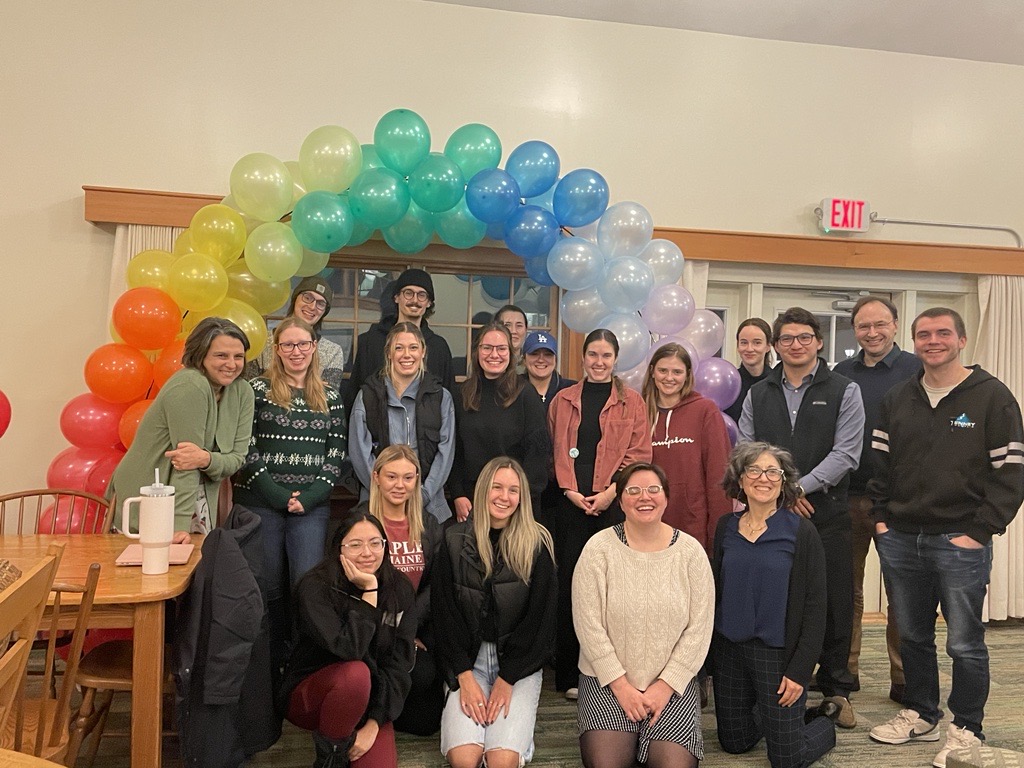IP 2000.01: Fall 2025
Navigate the Syllabus
What is this class and why am I taking it?
You are taking this course because you declared Interdisciplinary Studies (IDS) as your major — welcome!
This course, Foundations of Interdisciplinary Studies, is required of all IDS majors. The primary work for this course involves creating your major by working on an application, which consists of three parts: Contract, Planning Guide, and Program Statement Essay. Most of our other assignments are designed to work up to finishing your application (for instance, some of our early assignments are rough drafts of parts of your program statement).
My goal is also to orient you to our IDS community and some of the values that we hold true in our program.

Who is my instructor and how can I contact them?
My name is Hannah Mallon and I am your professor this semester! I am Interim Director of Interdisciplinary Studies for AY 25-26. You can call me Hannah, Professor Mallon, Mallon, M, or Elm. My pronouns are they/ she/ he/ any. I have been at PSU professionally since 2018 and I have both my undergraduate and graduate degrees at PSU. In short, I’ve been here awhile, and I know lots of stuff about how this place works, so feel free to come to me if you have questions, even beyond the work in this class.
You can reach me in lots of different ways—email, call, drop-in hours, and text (see below). You can also just make an appointment with me if you need. If you email me, I will reply to you within 48 hours or less. However, my working hours are generally Monday-Friday, 8 AM to 5 PM. I might not answer you on the weekends or in the evenings.
Make an appointment with me
Office 
Cell 
Physical Office 
Course Drop In Hours 

What are Drop In Hours?
Some professors call them “Office Hours,” but I call them “Drop-In Hours” because they are for you to do exactly that! During my Drop-In Hours, I will be in my office for you to come by if you need to talk for any reason. The IDS office (Lamson 003) is in the lower level of Lamson Library, between the Writing Center and the café.
Here’s a list of things you might want to talk to me about, but you really can come to talk about anything that’s on your mind.
- How you are doing in this class
- Confusion about an assignment
- Support with your IDS application
- Time management issues
- Strategies for keeping track of deadlines
- Something in your life that is getting in the way of your learning
- General questions about how things work at PSU – withdrawing, registering for classes, changing your major, financial questions, etc. If I can’t answer the question, I usually know who can!
- And anything else that’s on your mind
Do I need a textbook?
Nope! The FREE Open Education Resource (OER) for this class can be found here: clusterlearning.press.plymouth.edu. Other readings in the class will be accessible to everyone for free.
What am I going to learn in this class?
Part of that is dependent upon you, your peers, and the faculty members you talk with. What brings you to the IDS program? What program are you building? What are your professional and academic goals? What do you want out of this experience?
There are several learning goals for the course – skills and understandings that the creators of the IDS program wanted students to practice and think on in our courses. Here they are:
Students who successfully complete this course will have the opportunity and ability to…
F1a. Build a major
F1b. Know how to get advice now and in the future for their own interdisciplinary path
F2a. Define “interdisciplinarity,” informed by existing models
F2b. Articulate the requirements of the PSU Interdisciplinary Studies program
F2c. Present a polished Interdisciplinary Studies contract, planning guide, and essay
F3a. Identify the key PSU stakeholders in the IDS major (peers, profs, admin.)
F3b. Know how to get advice now and in the future for their own interdisciplinary path
F3c. Discern the difference between best practice and informed practice in order to make intentional decisions
F4a. Reflect upon the purpose of academic disciplines
F4b. Develop an understanding of the structure of academic majors
F5a. Articulate their customized major program with a focus on their purpose, goals, course selections, and approach to interdisciplinarity.
What am I going to do in this class?
Our course is broken up into the following modules/ assignments:
- Application Step 1/3: Understanding and Mapping Your Path
- Brainstorm a Major
- Catalog Shopping and Degree Works Mining
- Contract Draft
- Application Step 2/3: Seeking Expert Advice and Rationalizing
- Expert Advice Questions
- Expert Advice Paragraph
- Course Rationales
- Application Step 3/3: Finalizing Your Path
- Contract
- Planning Guide
- Essay
- Interdisciplinary Theory Part 1: What & Why
- Defining Interdisciplinarity Discussion
- Finding and Articulating Your “Why”
- Interdisciplinary Theory Part 2: Interdisciplinarity in the Wild
- Exploring Interdisciplinary Problem-Solving
- Interdisciplinary Problem-Solving Artifact
What should I bring to class?
- Please bring a laptop to every class session. You do not need to own a laptop — you can check one out at the Help Desk in the HUB with your student ID. We will do a lot of work in class together.
- It’s a good idea to bring a pen and paper to class just in case we’re doing something for which you find it useful.
- This isn’t necessarily something to bring to class, but please create a digital folder to keep your work for this class. I’ll be showing you how to use OneDrive for this, but you can use Google Docs, a folder on your computer, or another method that works for you. Having a folder to keep your work is going to be important for being organized and referencing previous work. And please NAME your documents with clear titles so you can find your work later.
- Breakfast and some caffeine. Seriously, I know an 8 AM class can be tricky, but we can get through it together! (I, your instructor, am not at all a morning person, so this is hard for me, too!)
How am I going to be graded?

This is a Pass/No Pass (P/NP) course. The whole point of this course is to get your IDS major application in good shape and set you on the path to take control of your education. All your assignments on Canvas are graded as either completed or not. There is no half-complete or partial credit of any sort. If something is marked as incomplete, I will give you feedback and you should plan on taking that feedback and revising your work. My feedback is based on what the IDS Council is looking for in your IDS Application materials and my goal is to get you approved by the council.
We will use Canvas to keep track of which assignments have been completed and turned in. There will also be a few self-evaluations that will help you know how you’re doing and help me understand what’s going well for you and what’s not.
How do I pass this course?
To earn a grade of P in this course, you must:
- Complete all required assignments and submit them on Canvas.
- Submit a completed IDS application to the IDS office following the instructions for how to submit it, then
- Have it accepted by the IDS Office as free of errors and ready to be sent to the IDS Council. Your application does not need to have been approved by the IDS Council, since in most cases they will not have time to get to it until this course is over.
Passing this course does not guarantee that your IDS application is approved by the IDS Council. You may still have revisions to make to your application materials before they can be officially approved.
In addition to the grading information above, you should be aware of PSU’s Fair Grading Policy.
What is the attendance policy?
Attendance has a direct effect on the classroom community and that’s everything in this course. For this reason, attendance is VERY important. I encourage you to strive for perfect attendance in this class since so much of it is based on class discussion and working with your various mentors. We all miss out if you aren’t around because everyone is an important piece of the puzzle in this class.
With all of that said, there are lots of reasons why students miss class, and I don’t need you to justify those absences. But, at a certain point, too many missed classes will make it difficult for you to finish work, be part of our community, and pass this course. If you hear from me about absences, don’t panic. Let’s just set up a time to talk and figure out what’s next.

Here is my attendance policy:
- Excused absences will have no direct effect on your grade. An excused absence is simply when you tell me ahead of time that you are going to be absent from class and you plan to complete your work outside of class and/or meet with me during Drop-In hours.
- Two unexcused absences will result in me reaching out to you. An unexcused absence is when you don’t communicate with me ahead of time that you are going to be absent. If I reach out to you, you aren’t in trouble and I’m not mad. My main concern is you — I want to make sure you’re ok. Then, I want us to come up with a plan to meet with me about your missed work and make a plan to complete it.
- Six unexcused absences will result in a “no pass” for the course. This is almost half of our class meeting times and indicates to me that you haven’t been able to be part of our class community and have missed a lot of important discussions, information, and work time. And, again, this is only if you don’t communicate your absences with me beforehand.
- TLDR: If you need to be absent from class, talk to me beforehand and stay on top of your work. That’s it!
The University’s Excused Absence Policy can be found here: Excused Absence Policy.
What other class policies should I know about?
Basic Needs
College can be challenging to navigate, and it will be hard for you to learn if your basic needs aren’t met— if you aren’t getting good nutrition, or enough sleep, if you feel lonely or isolated, or if you’re anxious about your living situation, finances, safety, resources, or other issues. Fortunately, there are many people and resources on campus that can provide support. Your academic advisor, your instructors, your Student Success Coach, Student Account Services, and many others can answer questions you have and help you find resources you need. I can also help you find the resources you need to be successful; you can always reach out to me if you find yourself struggling. On Canvas, please refer to the module titled “If You Need Support” for a bunch of resources.
Academic Honesty
Presenting someone else’s work as your own or without attribution is a violation of the University’s Academic Integrity Policy, which can be found here: Academic Integrity Policy. Please also be aware that presenting the work of generative “AI” (like ChatGPT) as your own work is a violation of academic integrity.
ADA Statement
Plymouth State University is committed to providing students with documented disabilities equal access to all university programs and facilities. If you think you have a disability requiring accommodations, you should contact Campus Accessibility Services (CAS), located in Speare 210 (535-3300) to determine whether you are eligible for such accommodations. Academic accommodations will only be considered for students who have registered with CAS. If you have a Letter of Accommodation for this course from CAS, please provide the instructor with that information privately so that you and the instructor can review those accommodations.
Technology Resources
We will use Canvas and this website as our primary platforms in this class. I will post all assignments on Canvas and you can check your progress there. This site will be where you will find our course schedule and relevant links and resources. We will use Google docs or OneDrive for collaboration and interaction. We will be able to collaborate on text documents, slide presentations, and other Microsoft or Google tools.
If you need help using the various technology tools and software available on campus, or if you are experiencing problems with your personal technology devices (laptop, phone, tablet,) the Helpdesk is available in HUB 123, Monday – Friday, 8:00 a.m. – 5:00 p.m. You can also contact them by phone at 603-535-2929 or via email at helpdesk@plymouth.edu.
Accommodations to Support Learning
Each of us learns in different ways, and everyone needs some kind of help in order to learn effectively.
The PSU policy for academic accommodations is: “Plymouth State University is committed to providing students with documented disabilities equal access to all university programs and facilities. If you think you have a disability requiring accommodations, you should contact Campus Accessibility Services (CAS), located in Speare 209 (603-535-3300) to determine whether you are eligible for such accommodations. Academic accommodations will only be considered for students who have registered with CAS.”
If you have a Letter of Accommodation for this course from CAS, please provide me with that information privately so that we can review those accommodations together. Even if you aren’t eligible for academic accommodations through the CAS, please share your ideas about what I can do to support your learning.
